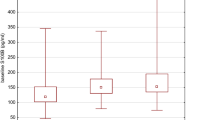Abstract
IT has been generally recognized that sodium and potassium ions are essential to neural conduction and to the normal functioning of the nervous system. The role of lithium in nerve conduction is less understood. It does reduce manic hyperactivity and elation2–5, however; thus its therapeutic use in the manic phase of manic depressive psychosis. A substance capable of producing similar improvements in the depressive phase remains to be discovered.
This is a preview of subscription content, access via your institution
Access options
Subscribe to this journal
Receive 51 print issues and online access
$199.00 per year
only $3.90 per issue
Buy this article
- Purchase on Springer Link
- Instant access to full article PDF
Prices may be subject to local taxes which are calculated during checkout
Similar content being viewed by others
References
Meltzer, H. L., J. Neurochem., 13, 423 (1966).
Cade, J. J., Med. J. Austral., 36, 349 (1949).
Gershon, S., and Yuwiler, A., J. Neuropsychiat., 1, 229 (1960).
Schou, M., et al., J. Neurol. Psychiat., 17, 250 (1954).
Wharton, R. N., and Fieve, R. R., Amer. J. Psychiat., 123, 706 (1966).
Author information
Authors and Affiliations
Rights and permissions
About this article
Cite this article
MELTZER, H., TAYLOR, R., PLATMAN, S. et al. Rubidium: a Potential Modifier of Affect and Behaviour. Nature 223, 321–322 (1969). https://doi.org/10.1038/223321a0
Received:
Revised:
Issue Date:
DOI: https://doi.org/10.1038/223321a0
This article is cited by
-
Rubidium chloride modulated the fecal microbiota community in mice
BMC Microbiology (2021)
-
The Effect of Natural Geochemical Background on Neurological and Mental Health
Exposure and Health (2020)
Comments
By submitting a comment you agree to abide by our Terms and Community Guidelines. If you find something abusive or that does not comply with our terms or guidelines please flag it as inappropriate.


